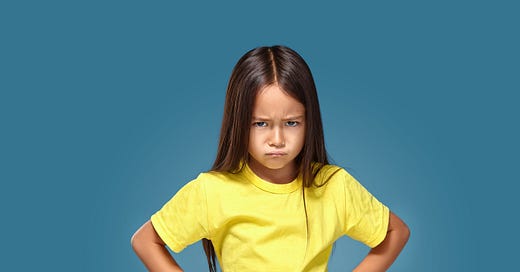Dear Is My Kid the Asshole?,
My daughter regularly spouts vitriol at me. When it’s not “I hate you,” it’s “you’re horrible” or “you’re the meanest mommy ever!!!” I know she doesn’t really mean it, but I’m never sure how to respond. Do I ignore it? Tell her she’s hurting my feelings? Help!
Sincerely,
Despised
Dear Despised,
I remember when my daughter first said she hated me, and how hard I tried to get past the sting of the words so I could figure out what to do. (Reader, I did not figure out what to do.)
Thankfully, there are people in the world whose job it is to know how to handle situations like this, and boy, am I glad I have some of them on speed dial.
The first thing to remember about these terrible moments is that, yes, it’s true, your kid doesn’t actually mean what they said. To us, the word “hate” has all sorts of horrible and profound connotations, so when we hear our kids say it, we panic. But “for them, it's just this word that they've learned that means, ‘I'm really mad at you,’” said Rebecca Schrag Hershberg, a clinical psychologist who specializes in early childhood social-emotional development and mental health. They want us to see how serious the situation is, and they may also want us to feel as terrible as they do — so they pull out all the stops and use the big bad H word.
Often, kids say mean things to us because they’re upset about at a limit we’ve set: We’ve taken away the iPad, we’ve said they can’t read any more books before bedtime, we’ve told them they can’t get an escalator for Christmas. “The child's totally triggered and is just spewing out venom,” said Claire Lerner, a child development specialist and the author of the new book Why Is My Child In Charge? (which I recommended in a previous newsletter). If your kid begs for the stuffed unicorn she sees at Target and you say no, and she says she hates you, “that is code for ‘Mom, this is so hard, I want that unicorn so badly. And I'm having a really hard time managing my big feelings about not getting it,’” Lerner said.
Also, let’s put this in context: Adults often say hurtful things to each other, even though the part of our brain responsible for impulse control is fully developed. Kids are working with about a half deck of impulse control cards, and they’re living in a world in which they frequently don’t get what they want, so we should not be at all surprised if we’re being attacked by kid venom all the frigging time.
Something else to keep in mind is that, ironically, kids who say these kinds of things to their parents are kids who trust their parents and feel unconditionally loved. They’re kids who feel can experiment with new behaviors and words and know that, even if they make a bad choice, they’ll still be loved and accepted. “If your child is saying ‘I hate you,’ chances are your child feels pretty safe and comfortable with you. And that's actually a good thing,” Hershberg said. (God bless parenting experts who can put a positive spin on anything.)
But how should you respond to your kid— and why? This is where things get more interesting.





